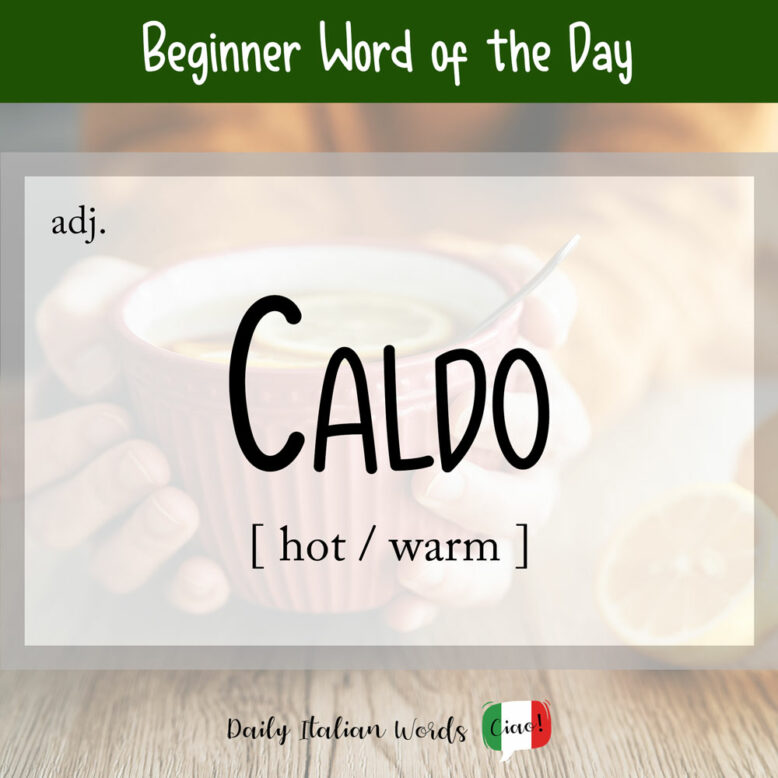The word caldo can refer to anything that is hot or warm, be it the temperature, weather, food or clothing.

Because it is an adjective, the ending changes depending on whether the subject is masculine, feminine, and/or plural.
- caldo = masculine, singular
- calda = feminine, singular
- caldi = masculine, plural
- calde = feminine, plural
La minestra è ancora calda, ti servo un altro piatto?
The soup is still hot, do you want another bowl?
The way you’d say It is hot in Italian when talking about the weather is Fa caldo. Don’t forget that many weather-related expressions in Italian use the verb fare (to do/make) instead of essere (to be)!
Fa molto caldo oggi. Ti va di andare al mare a fare un bagno?
It is very hot today. Do you feel like going to the seaside for a swim?

Some common complaints you’ll definitely hear in Italy once the weather turns hot and humid in the summer months include:
- Sto morendo di caldo! = The heat is killing me!
- Fa un caldo boia! = It’s boiling hot!
- Fa un caldo infernale! = It’s as hot as hell!
- Fa un caldo bestiale! = It’s boiling hot!
- Fa un caldo da morire! = It’s so hot that you could die!
- Che caldo che fa! = It’s so hot!
- Fa un caldo insopportabile! = It’s unbearably hot!
- Fa un caldo terrible! = It’s terribly hot!
- Non sopporto il caldo! = I can’t stand the heat!
- Oggi si soffoca! = It’s suffocatingly hot today!
- Si muore di caldo! = You can die from the heat!
- Non si respira dal caldo! = It’s so hot you can’t breathe!

As we already saw from a couple of the examples above, caldo can also translate as heat when used as a noun.
Soffro il caldo anche d’inverno!
I suffer from the heat even in the winter!
In a figurative sense, caldo can be used to describe someone who is passionate, excitable or easily changeable (e.g. avere il sangue caldo = to be hot-blooded; avere la testa calda = to be hot-headed).
It may also describe displays of enthusiasm, affection or kindness (e.g. una calda accoglienza = a warm welcome; un caldo abbraccio = a warm hug), warm colours or sounds (e.g. colori caldi = warm colours), and even fresh or recent news (e.g. una notizia calda = a fresh piece of news).
A great expression in Italian is a caldo (in the heat of the moment) which can be used either with the negative connotation of hastiness, or with a neutral connotation.
- decidere a caldo = decide in the heat of the moment
- una reazione a caldo = a rash / spur of the moment decision
One of my favourite words in Italian is calduccio, the snug-sounding diminutive of caldo. It translates as warmth or warm in English.
Mi piace stare al calduccio sotto le coperte.
I like staying warm (and snug) under the covers.

Hot tip: In English, we use the slang word hot to talk about someone we find good-looking but in Italian, caldo doesn’t have this figurative meaning. If you want to comment on someone’s attractive appearance, you can use the slang word figo for a man or figa / gnocca for a woman. You may also hear some Italians using the English word sexy for either sex.
Expressions featuring ‘caldo’
Non fare né caldo né freddo
Literal translation: to be neither hot nor cold
English meaning: to underwhelm, to cut no ice with someone
Battere il ferro finché è caldo
Literal translation: to strike while the iron is hot
English meaning: to strike while the iron is hot
Prendersela calda per qualcosa / qualcuno
Literal translation: to take it hot for something / someone
English meaning: to bend over backwards for something / someone
Tenere in caldo
Literal translation: to keep hot
English meaning: to keep on the back burner, to have on standby
Heather Broster is a graduate with honours in linguistics from the University of Western Ontario. She is an aspiring polyglot, proficient in English and Italian, as well as Japanese, Welsh, and French to varying degrees of fluency. Originally from Toronto, Heather has resided in various countries, notably Italy for a period of six years. Her primary focus lies in the fields of language acquisition, education, and bilingual instruction.


